The hair mask market is estimated to be valued at USD 2.4 billion in 2025 and is projected to reach USD 4.0 billion by 2035, registering a compound annual growth rate (CAGR) of 5.1% over the forecast period. Regulatory frameworks are playing an increasingly critical role in shaping product development, formulation standards, and market access across global regions. Compliance with cosmetic safety regulations, including ingredient restrictions and labeling requirements, is essential for manufacturers to maintain market presence and avoid penalties.
In the Asia-Pacific region, authorities are enforcing stricter guidelines on chemical usage, preservatives, and heavy metals in hair care formulations. Europe continues to uphold the EU Cosmetics Regulation, requiring rigorous safety assessments, standardized ingredient lists, and transparent labeling, which directly affects production timelines and cost structures. In North America, the FDA’s cosmetic regulations and state-level initiatives, such as California’s Proposition 65, influence ingredient selection and consumer communication, mandating disclosure of potential carcinogens and reproductive toxins. These regulatory demands drive formulation innovation, prompting shifts toward naturally derived ingredients, paraben-free, and sulfate-free products.
The testing protocols and certification standards, including cruelty-free and hypoallergenic labels, impact manufacturing processes and supply chain compliance. Overall, adherence to these regulations ensures market legitimacy, consumer trust, and long-term sustainability, making regulatory alignment a strategic priority for players seeking to capture growth in a competitive and increasingly regulated Hair Mask Market.
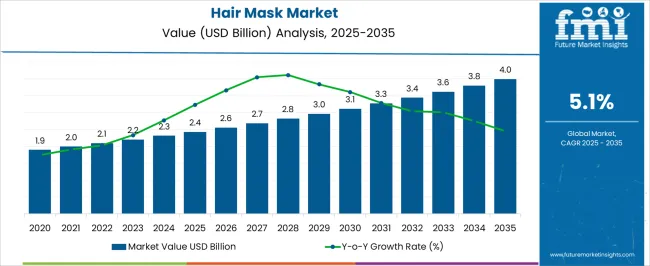
| Metric | Value |
|---|---|
| Hair Mask Market Estimated Value in (2025 E) | USD 2.4 billion |
| Hair Mask Market Forecast Value in (2035 F) | USD 4.0 billion |
| Forecast CAGR (2025 to 2035) | 5.1% |
The current landscape is being shaped by a surge in consumers seeking intensive hair treatment options that restore moisture, repair damage, and improve scalp health. Industry press releases and product announcements indicate that innovations in formulations, especially those targeting specific concerns like frizz control, hair fall, and damage from styling tools, are driving growth.
Shifts in lifestyle and rising disposable incomes, particularly in emerging markets, have expanded access to premium and specialized hair care solutions. Additionally, beauty industry news highlights a trend toward clean and sustainable ingredients, with brands emphasizing cruelty-free and chemical-free offerings.
The future outlook remains strong as e-commerce platforms and salon partnerships continue to extend market reach. Evolving consumer preferences toward natural and customized care regimens are expected further to support expansion in both mature and emerging regions.
The hair mask market is segmented by type, nature, price range, application, end use, and geographic regions. By type, the hair mask market is divided into Steam-free masks and Thermal steam masks. In terms of nature, the hair mask market is classified into Natural, Organic, and Synthetic. Based on price range of the hair mask market is segmented into Medium, Low, and High. By application, the hair mask market is segmented into Moisturizing masks, Color-depositing masks, Scalp treatments, Anti-aging masks, and Others (anti-frizz masks, protein masks, etc.).
By end use, the hair mask market is segmented into Individual and Commercial. Regionally, the hair mask industry is classified into North America, Latin America, Western Europe, Eastern Europe, Balkan & Baltic Countries, Russia & Belarus, Central Asia, East Asia, South Asia & Pacific, and the Middle East & Africa.
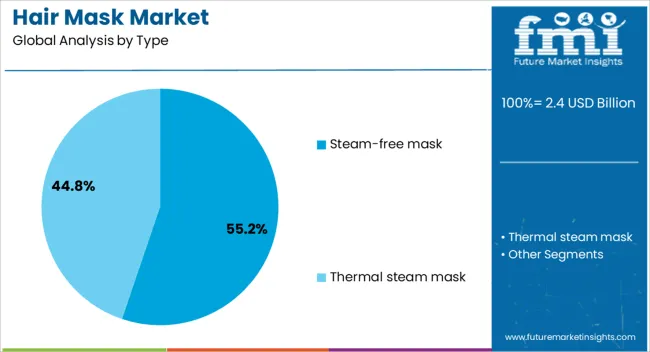
The steam-free mask segment is projected to contribute 55.2% of the Hair Mask market revenue share in 2025, establishing it as the leading type segment. Its dominance is being attributed to the convenience of application and compatibility with various hair types without the need for specialized equipment. Product innovation announcements and beauty journals have emphasized that steam-free masks are widely preferred for at-home use due to their ease of use and effective penetration into the hair shaft without heat.
The formulation flexibility allows brands to integrate nourishing ingredients such as keratin, proteins, and essential oils, aligning with consumer expectations for deep conditioning and damage repair. Adoption has also been supported by time-saving attributes, making them suitable for busy consumers.
Furthermore, their availability across both premium and mass-market segments has enabled wider reach. These functional advantages have reinforced the segment’s leadership in the overall market landscape.
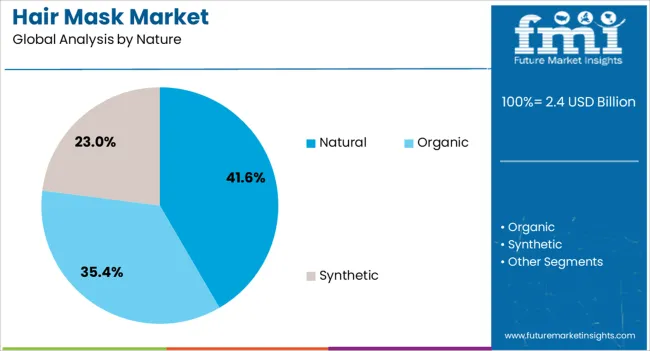
The natural segment is expected to hold 41.6% of the Hair Mask market revenue share in 2025, maintaining a strong position within the nature category. This growth is being supported by increasing consumer preference for ingredient transparency and chemical-free formulations, as highlighted in personal care trend reports and brand announcements.
Beauty industry news indicates that rising awareness of scalp health, along with concerns over synthetic additives, has led to heightened demand for products made with plant-based and naturally derived ingredients. Additionally, the segment has gained traction through endorsements by dermatologists and influencers who advocate for clean beauty practices.
Packaging and labelling focused on sustainability and non-toxic claims have further encouraged adoption among environmentally conscious consumers. These factors have contributed to the segment’s steady growth, aligning with broader trends in ethical sourcing and wellness-focused hair care.
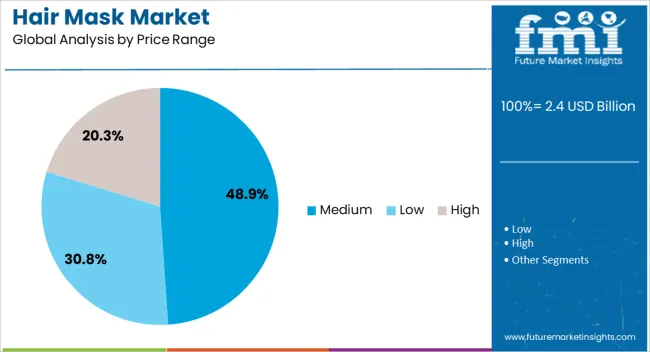
The medium price range segment is anticipated to account for 48.9% of the Hair Mask market revenue share in 2025, emerging as the leading segment in terms of pricing. This leadership is being driven by consumer demand for quality hair care solutions that deliver visible results without premium pricing.
According to industry insights and product positioning strategies shared by brands, the medium price tier balances affordability with efficacy, attracting a wide consumer base across urban and semi-urban markets. The segment includes both drugstore brands and accessible salon-quality products that cater to daily repair and nourishment needs.
Promotions, bundled offerings, and availability on e-commerce platforms have also supported its wide adoption. The preference for value-for-money solutions with high ingredient quality has cemented the medium price range as a favored choice among cost-conscious yet quality-driven consumers.
The market has been expanding due to growing consumer awareness of hair health, damage repair, and nourishment needs. Hair masks, enriched with botanical extracts, proteins, vitamins, and oils, have been adopted to improve hair texture, manageability, and strength. Demand has been driven by the rise of at-home hair care routines and professional salon treatments. Product innovation, including targeted formulations for color-treated, frizzy, or thinning hair, has enhanced user appeal. Marketing campaigns and digital promotion have further increased product visibility and adoption globally.
The growing demand for hair masks with natural and botanical ingredients has significantly influenced market growth. Extracts such as argan oil, shea butter, aloe vera, and hibiscus have been incorporated to provide nourishment, hydration, and shine. Consumers have increasingly favored sulfate-free, paraben-free, and cruelty-free formulations due to health-conscious choices and environmentally responsible practices. The hair masks with plant-based proteins have been used to repair damaged hair and reduce breakage. The appeal of natural ingredients has also been enhanced by digital content showcasing ingredient benefits, DIY usage, and expert recommendations. The preference for botanical formulations has encouraged manufacturers to expand product lines with region-specific plant extracts, creating a diverse portfolio to meet consumer expectations. This trend has reinforced the role of natural ingredients as a central driver in the hair mask market.
Hair damage caused by chemical treatments, heat styling, and environmental factors has been a major factor driving hair mask adoption. Daily styling routines, frequent coloring, and exposure to pollutants have increased the need for intensive hair care solutions. Hair masks have been formulated to address dryness, split ends, frizz, and scalp stress, offering restorative and conditioning effects. Professional salons and at-home treatment kits have provided accessible solutions for diverse consumer groups. The emphasis on preventive hair care has been complemented by products targeting specific hair types, such as curly, fine, or color-treated strands. Lifestyle changes, including higher awareness of grooming standards and self-care routines, have reinforced adoption. These factors have positioned hair masks as essential tools in modern hair maintenance, driving steady growth across premium and mass-market segments globally.
Innovations in formulation, texture, and application methods have strengthened the hair mask market. Developments in encapsulated nutrients, time-release technologies, and lightweight conditioning agents have improved product efficacy without leaving residue. Sheet masks, overnight masks, and leave-in variants have been introduced to enhance convenience for consumers. Manufacturers have also focused on blending multiple active ingredients such as keratin, vitamins, and essential oils to provide targeted solutions for hair growth, repair, and hydration. Packaging innovations including airless pumps, tubes, and recyclable containers have improved product longevity and sustainability. Digital education on proper application methods and personalized recommendations using AI-based hair analysis tools have increased product adoption. These technological and product advancements have enhanced user experience, satisfaction, and loyalty, further driving the growth of the global hair mask market.
The distribution of hair masks has been greatly influenced by the growth of e-commerce and omnichannel retail strategies. Online platforms have enabled consumers to access international brands, product reviews, and subscription models conveniently. Retail expansion through supermarkets, specialty beauty stores, and professional salons has strengthened visibility and availability. Marketing campaigns leveraging social media, influencers, and tutorials have enhanced engagement, particularly among younger demographics. Manufacturers have introduced region-specific formulations to cater to local preferences while promoting global brand awareness. E-commerce analytics have allowed companies to optimize product offerings and stock levels based on consumer behavior insights. This multi-channel distribution approach has ensured wider reach and increased consumer trust, playing a critical role in the consistent growth and penetration of hair masks across urban and semi-urban markets worldwide.
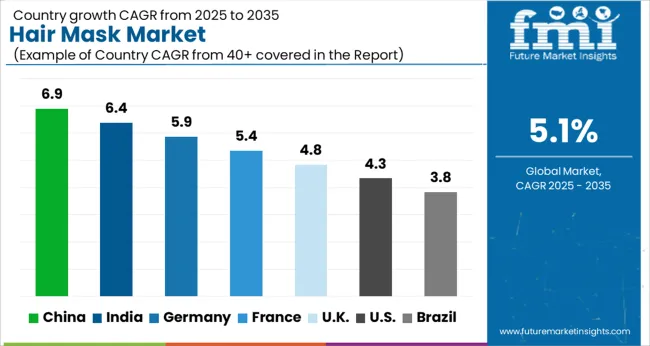
The market is projected to grow at a CAGR of 5.1% between 2025 and 2035, driven by rising consumer focus on hair care, introduction of natural and specialized formulations, and increasing salon and at-home usage. China, with a 6.9% CAGR, leads through high consumer awareness and growing beauty product retail channels. India follows at 6.4%, expanding adoption due to rising personal care expenditure and lifestyle trends. Germany grows at 5.9%, supported by premium product launches and advanced cosmetic R&D. The UK, at 4.8%, innovates through organic and specialized hair treatment offerings. The USA, at 4.3%, experiences steady demand from both mass-market and professional segments. This report covers 40+ countries, with the top markets highlighted here for reference.
China is projected to grow at a CAGR of 6.9% in the market from 2025 to 2035. Rising consumer focus on hair care and appearance, coupled with increasing awareness of hair health, is driving demand for treatment and conditioning products. Premium and natural formulations are gaining traction among urban consumers, while e-commerce platforms are enhancing product accessibility. Domestic manufacturers are expanding production capabilities, and international brands are strengthening distribution networks. With rising beauty consciousness and a growing interest in professional-grade hair treatments, China is expected to remain a key market in the Asia Pacific region.
India is anticipated to record a CAGR of 6.4% in the industry from 2025 to 2035. Increasing consumer inclination toward personal grooming and natural hair care formulations is fueling growth. Tier 1 and Tier 2 cities show rising adoption of herbal and premium hair masks. E-commerce platforms and beauty salons are emerging as major distribution channels, while international brands are focusing on localized products to capture market share. Awareness campaigns highlighting hair health benefits are accelerating consumer acceptance. Government initiatives promoting wellness and beauty care also contribute to market development.
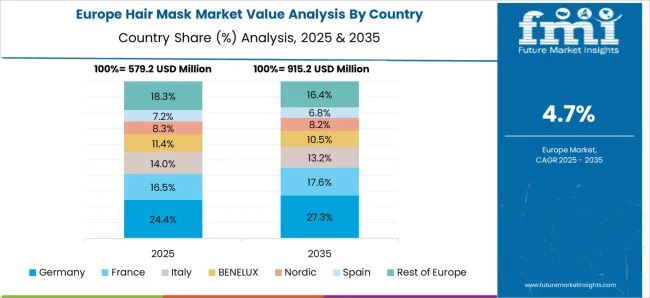
Germany is expected to grow at a CAGR of 5.9% in the market from 2025 to 2035. Rising consumer awareness of hair health, coupled with demand for sustainable and high-quality formulations, is driving product adoption. Retail expansion in drugstores, specialty stores, and e-commerce channels is enhancing availability. Innovations in natural ingredients and professional salon-quality products are creating differentiated offerings. With a strong preference for certified organic and cruelty-free products, Germany continues to attract brands focusing on sustainability and efficacy.
The United Kingdom is projected to expand at a CAGR of 4.8% in the market from 2025 to 2035. Growing interest in premium and DIY hair treatments is driving sales. Consumers are increasingly seeking hair masks with natural and hydrating ingredients. Retailers and online marketplaces are widening product availability, while social media and beauty influencers are shaping purchasing decisions. Awareness of hair damage prevention and repair treatments is enhancing demand. Partnerships between salons and brands are further supporting market growth.
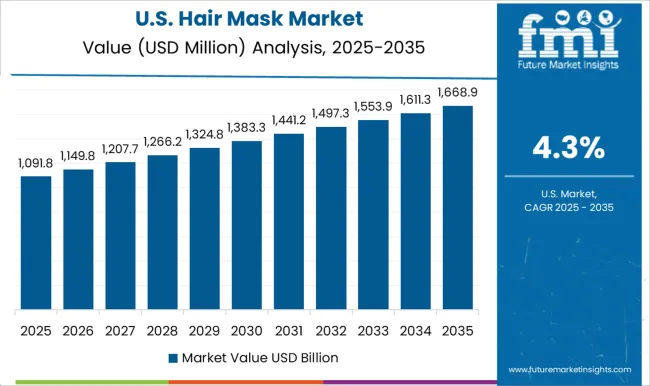
The United States is expected to record a CAGR of 4.3% in the market between 2025 and 2035. Rising demand for conditioning and repair treatments is supported by growing awareness of hair damage due to chemical treatments and environmental factors. Product innovation focusing on natural ingredients and vegan formulations is driving adoption. Major retailers and online platforms are enhancing distribution, while brands are investing in targeted marketing campaigns. Professional and at-home usage is increasing, reflecting the evolving consumer preference for holistic hair care solutions.
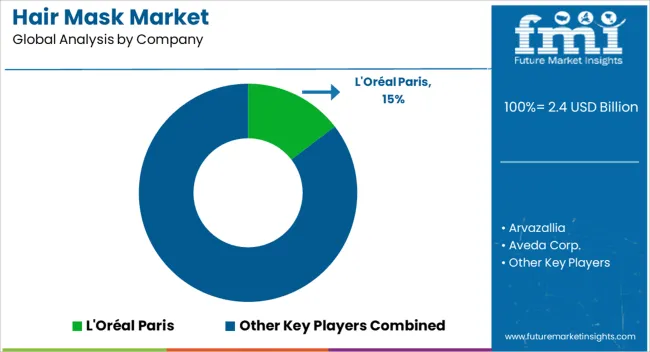
The market is defined by a blend of global beauty conglomerates and specialized hair care brands, with product portfolios targeting hydration, repair, and scalp health. L’Oréal Paris leads the market through extensive distribution channels, strong brand recognition, and consistent product launches that cater to various hair types and concerns. Unilever and Procter & Gamble maintain a significant presence with multi-brand strategies that combine mass-market accessibility with premium offerings, enhancing consumer reach across regions. Premium and professional-focused brands such as Aveda Corp., OLAPLEX, Wella International, and Shiseido Co., Ltd. have gained traction through salon partnerships and high-performance formulations that emphasize hair repair, strength, and shine.
Henkel AG & Co. KGaA and Kao Corporation continue to reinforce market share by integrating innovative ingredients and targeted solutions, particularly in restorative and nourishing hair masks. Emerging and niche players, including Arvazallia, EVA NYC, Leonorgreylusa, and MIELLE, focus on specialty formulations for natural hair, color-treated hair, and vegan-friendly products, positioning themselves as attractive alternatives to mainstream brands. Coty Inc. and Revlon, Inc. leverage celebrity endorsements and collaborations to boost visibility and consumer loyalty. Market entry is influenced by brand reputation and R&D capabilities, creating moderate barriers for new players. Collectively, these providers drive innovation and adoption, sustaining growth in the hair mask market globally.
| Item | Value |
|---|---|
| Quantitative Units | USD 2.4 Billion |
| Type | Steam-free mask and Thermal steam mask |
| Nature | Natural, Organic, and Synthetic |
| Price Range | Medium, Low, and High |
| Application | Moisturizing masks, Color-depositing masks, Scalp treatments, Anti-aging masks, and Others (anti-frizz masks, protein masks, etc.) |
| End Use | Individual and Commercial |
| Regions Covered | North America, Europe, Asia-Pacific, Latin America, Middle East & Africa |
| Country Covered | United States, Canada, Germany, France, United Kingdom, China, Japan, India, Brazil, South Africa |
| Key Companies Profiled | L'Oréal Paris, Arvazallia, Aveda Corp., Coty Inc., EVA NYC, Henkel AG & Co. KGaA, Kao Corporation, leonorgreylusa, MIELLE, OLAPLEX, Procter & Gamble, Revlon, Inc., Shiseido Co., Ltd., Unilever, and Wella International Operations Switzerland Sàrl. |
| Additional Attributes | Dollar sales by product type and distribution channel, demand dynamics across salons, retail stores, and e-commerce platforms, regional trends in hair care preferences across North America, Europe, and Asia-Pacific, innovation in natural ingredients, keratin and protein formulations, and sustainable packaging, environmental impact of chemical use, packaging waste, and water consumption, and emerging use cases in personalized hair treatments, scalp health solutions, and multifunctional hair care products. |
The global hair mask market is estimated to be valued at USD 2.4 billion in 2025.
The market size for the hair mask market is projected to reach USD 4.0 billion by 2035.
The hair mask market is expected to grow at a 5.1% CAGR between 2025 and 2035.
The key product types in hair mask market are steam-free mask and thermal steam mask.
In terms of nature, natural segment to command 41.6% share in the hair mask market in 2025.






Full Research Suite comprises of:
Market outlook & trends analysis
Interviews & case studies
Strategic recommendations
Vendor profiles & capabilities analysis
5-year forecasts
8 regions and 60+ country-level data splits
Market segment data splits
12 months of continuous data updates
DELIVERED AS:
PDF EXCEL ONLINE
Hair Mineral Analyzer Market Size and Share Forecast Outlook 2025 to 2035
Hair Regrowth Treatments Market Size and Share Forecast Outlook 2025 to 2035
Hair Growth Promoters / Anti-Hair Loss Agents Market Size and Share Forecast Outlook 2025 to 2035
Hair Extension Market Size and Share Forecast Outlook 2025 to 2035
Hair Bond Multiplier Market Size and Share Forecast Outlook 2025 to 2035
Hair Loss Prevention Products Market Size and Share Forecast Outlook 2025 to 2035
Hair Thinning Solutions Market Analysis - Size and Share Forecast Outlook 2025 to 2035
Hair Growth Serums Market Analysis - Size and Share Forecast Outlook 2025 to 2035
Hair Finishing Stick Market Size and Share Forecast Outlook 2025 to 2035
Hair Serum Market Size and Share Forecast Outlook 2025 to 2035
Hair Straightener Market Size and Share Forecast Outlook 2025 to 2035
Hair Removal Wax Pen Market Size and Share Forecast Outlook 2025 to 2035
Hair Perfume Market Size and Share Forecast Outlook 2025 to 2035
Hair Dryer Market Analysis - Size, Share, and Forecast Outlook 2025 to 2035
Hair Serums Ingredient Market Size and Share Forecast Outlook 2025 to 2035
Hair Lightening Products Market Size and Share Forecast Outlook 2025 to 2035
Haircare Supplement Market - Size, Share, and Forecast Outlook 2025 to 2035
Hair Care Market Size and Share Forecast Outlook 2025 to 2035
Hair Wig and Extension Market Analysis – Size, Share & Forecast 2025 to 2035
Hair Brush Market Analysis by Growth, Trends and Forecast from 2025 to 2035

Thank you!
You will receive an email from our Business Development Manager. Please be sure to check your SPAM/JUNK folder too.
Chat With
MaRIA